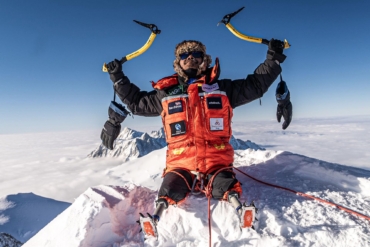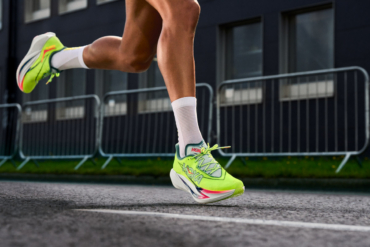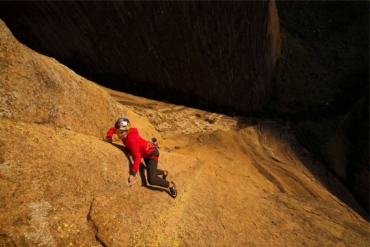When SCARPA released the original version of the Boostic in 2012, it received widespread praise for the rare combination of comfort, support, and high-end performance. Designed by climbing shoe mastermind Heinz Mariacher, the first-generation Boostic was always going to be difficult to improve.
Although many climbers were skeptical about a redesign, the 2021 Boostic quickly squashes any lingering skepticism. The new version is outstanding.
Launched this spring, the new Boostic sports an updated black and blue color scheme, and it costs $199. In recent years, many high-profile climbing shoe manufacturers focused their efforts on super-soft models. Recent trends have favored sensitivity and competition-style indoor bouldering.
While the soft shoe movement has produced some stellar shoes like the La Sportiva Solution Comp and the So iLL New Zero Pro, SCARPA is pushing back against the trend with the Boostic.
In short: I wore the Boostics on the slick, slightly overhanging limestone of American Fork Canyon and the thin granite crystals and smears of Little Cottonwood Canyon. In both venues, the Boostics performed exceptionally well. However, they truly shined when the climbing required the use of small footholds.
I found the Boostics instilled newfound confidence that allowed me to apply weight to tiny holds and nubbins without overthinking. Right out of the box, the Boostics seemed to elevate the fluidity of my edging technique.
2021 SCARPA Boostic Climbing Shoe Review
While soft “rubber sock”-style shoes often come with a very thin midsole or no midsole at all, the Boostic is built with a robust curved midsole that wraps around the sides of the foot. The supportive build of the shoe ensures plentiful support and does not lose its integrity over time.
This innovative midsole combines with SCARPA’s DTS Active Rubber Rand, which connects the heel of the shoe to the forefoot. The support and structure built into the Boostic are essential for generating power when standing on the smallest footholds.
Although the Boostic falls into the stiff shoe category, it still manages to offer elite sensitivity and precision. This is the defining trait of the Boostic: stiff yet responsive; powerful yet delicate. Thanks to a thin 1mm midsole, this sacred sensitivity isn’t reduced too much by the standard-thickness 4mm outsole.
SCARPA told us it would have loved to include an ultrathin 1mm outsole for maximum sensitivity. However, a shoe with such thin rubber would simply wear out too fast.
There are stiffer shoes out there, but the Boostic manages to combine the support of a stiff shoe with the underfoot sensitivity of a much softer one. Compared to the original model, the new Boostic features a much thinner and more supple upper.
Above the toes, a patch of Alcantara fabric is integrated into the shoe to reduce thickness without losing durability. Alcantara is a suede-like microfiber that stretches minimally and holds up well to abrasion.
A stretchy gusset makes entry relatively easy. And two Velcro straps are sewn onto large flaps to allow for maximum tensioning and minimal dead space.

Full-Length Sole
Many popular high-end shoes come with a two-piece sole that is split under the arch of the foot. With its single-piece, full-length sole, the Boostic again refuses to follow the trends of today’s climbing shoes.
A full-length sole will always be best for top-level edging. So, this is a great design choice for an edging monster like the Boostic.
What’s more, the Boostic is wildly asymmetric. This will take some getting used to for those who have been climbing in symmetrical shoes. But the banana-esque shape of the shoe helps to channel power into the point of the shoe, where the big toe sits.
To get the most performance out of the Boostic, opt for a tight and toe-curling fit. As always, if your shoes are terribly uncomfortable, you probably won’t climb well in them. However, the Boostics are designed to stand powerfully on tiny holds and will work best when sized aggressively.
Fit and Sizing
My street shoe size is a men’s 10 (U.S.). SCARPA recommended that I stick with a size 10 for the Boostic, which is a European 43.
The Boostic runs small for the size, so my street shoe size fits aggressively. My toes are slightly compressed into the toebox, and my big toe specifically feels like it is being channeled into the point of the shoe.
It’s a tight fit, but I am able to wear the shoes for a long sport route or several boulder problems without needing to give my feet a break. For a high-performance shoe with such an asymmetric shape, they’re relatively comfortable.
For those looking for ultimate performance at the cost of some discomfort, sizing down a half-size from your street shoe may yield good results. SCARPA recommends climbers who are familiar with the old Boostic size down a half-size when transitioning to the new model.
The Boostic widens toward the toebox and features a very high arch. I have a medium-wide forefoot and a low-volume heel, and the Boostic conforms to my foot with very little dead space.
Compared to the old version, the new version is wider in the forefoot and thinner in the heel. This results in a slightly lower volume shoe overall.

Where and When to Use the Boostic
The Boostics aren’t the best possible choice for smearing on volumes, toe hooking through horizontal roofs, or pure crack climbing. They definitely weren’t made to be a gym-specific shoe, either.
It also isn’t fair to say the Boostic is only good for a single style of climbing, but there’s no question these shoes specialize in technical and powerful edging. Wearing the Boostics on moderate slabs or hand cracks would be like driving a McLaren in rush-hour traffic.
These shoes can only exhibit their full potential on the terrain they were specifically designed to climb. Crags that are well-suited to the Boostic include the vertical walls of Smith Rock, Ore., and the long technical multipitch routes of the El Potrero Chico.
Check Price at Backcountry






